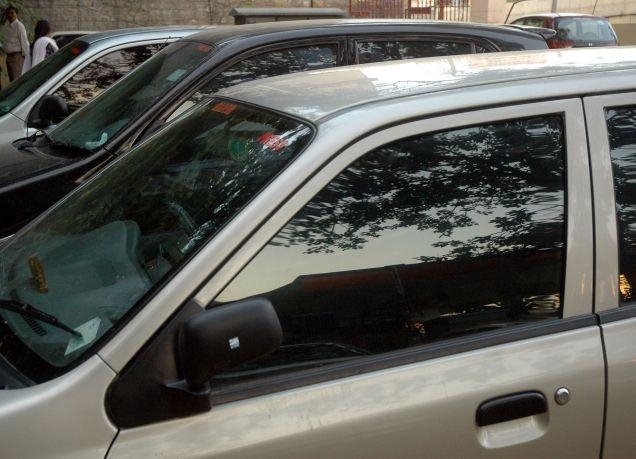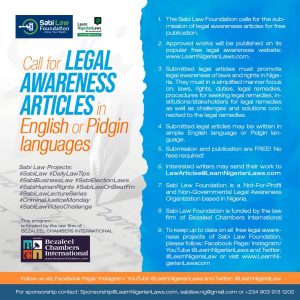All through this writing I will generalise anything that makes the occupants or things in a motor vehicle to be invisible or obscure as “TINTING” and such glasses as “TINTED”. To protect the society (Nigeria) from insecurity, on 8th day of February, 1991 the then military President of Nigeria; General Ibrahim B. Babangida promulgated a decree prohibiting thetinting and use of cars with tinted glasses. The said decree is now known as Motor Vehicles (Prohibition of Tinted Glass) Act, 1991; made up of only six (6) sections. Since the enactment of the law, there has not been any serious enforcement, until recently after the Inspector General of Police; Mr.Mohammed DahiruAbubakar reiterated his willingness to do so. This raised dust among the populace; many were not aware of the prohibiting law and its sanctions. Below is a detailed analysis of the law; what does it say, who is guilty, who is exempted, procedure to obtain an exemption (permit), punishment for offenders and jurisdiction of courts. Hence this writing is better titled; A REVIEW OF THE NIGERIAN LAW ON PROHIBITION OF TINTED GLASSES IN MOTOR VEHICLES.
THE PROHIBITION
By the provisions of SECTION 1 SUBSECTION 1 OF MOTOR VEHICLES (PROHIBITION OF TINTED GLASS) ACT, 1991 no person in Nigeria is permitted to cause ANY GLASSfitted on a motor vehicle to be tinted, shaded, coloured lightly or thickly, darkened or treated in any other way to the extent that the persons or objects in the vehicle are obscured, invisible and not seen with the naked eyes.
The above prohibition further means that no person (human being or juristic being; companies and incorporated trustees) is permitted to place, display, install, affix, use, or put on a motor vehicle any glass that will hide the contents of such vehicle. The prohibited act is making the passengers and contents of a motor vehicle invisible by anything done on the glasses of the vehicle. Whether the glasses is painted like as seen in many of the advertisement vehicles, or covered with cotton and blinds, or by any means whatsoever made to make the occupants of the vehicle unable to be seen with by a naked eyes it is not allowed. Where a motor vehicle is partly tinted, if the tinted parts/sections makes the occupants of that section/part invisible such is illegal. That is often seen in most bus-cars and SUVs, where the rear side glasses are often tinted by the manufacturers. It is irrelevant whether a tinted car is parked in a garage or seen in use on a federal or state road, the prohibition is on the car bearing a tinted glass that renders occupants invisible. This prohibition is only for motor vehicles, hence does not bind bicycles and anything not a motor vehicle. Unfortunately, the Act and even the Interpretation Act did not define or state what a motor vehicle is. According to WIKIPEDIA, “a motor vehicle (road vehicle) is a self-propelled wheeled vehicle that does not operate on rails, such as trains or trolleys. The vehicle propulsion is provided by an engine or motor, usually by an internal combustion engine, or an electric motor, or some combination of the two, such as hybrid electric vehicles and plug-in hybrids. For legal purposes motor vehicles are often identified within a number of vehicle classes including automobiles or cars, buses, motorcycles, motorized bicycles, off highway vehicles, light trucks or light duty trucks, and trucks or lorries”.
WHO IS EXEMPTED
A popular cliché, says that “there is no law without an exception” and this law is not an exception to the cliché itself. SECTION 1 SUBSECTION 1 OF MOTOR VEHICLES (PROHIBITION OF TINTED GLASS) ACT, 1991 exempted certain circumstances/cases wherein a person may be allowed to have any a tinted glass fitted on his motor vehicle with a permission of the appropriate authority. Such cases/circumstances are provided in SECTION 1 SUBSECTION 2 OF MOTOR VEHICLES (PROHIBITION OF TINTED GLASS) ACT, 1991 as “HEALTH” or “SECURITY”.It is worthy to note that the act does not exempt any person, office, class, profession and group rather exempted certain circumstances/cases that a person and office can find himself in. Hence an exemption is to be issued to a person because of a challenging health or security risk. So that, where such health/security circumstance vanishes or terminates such permission should be denied or withdrawn.
It is logical that any person seeking permission from the appropriate authority must establish a verifiable health or security reasons, to avoid abuse.According to SECTION 2 SUBSECTION 3, PARAGRAPH (A) OF MOTOR VEHICLES (PROHIBITION OF TINTED GLASS) ACT, 1991the appropriate authority to grant permission to any person in Nigeria to use tinted glass on his motor vehicle is the Inspector General of Police or any person or authority that the Inspector General of Police delegates such powers to. It means that strict senso, for the President of Nigeria and his aides to have and use a motor vehicle with tinted glass, there must be a permission from the Inspector General of Police premised either on “health” or ”security” reasons. Consequently, it is illegal for the president, his aides, chief of defence staff, legislative members, governors, army, security operatives, political office holders, traditional leaders, clergies, celebrities, farmers, unprivileged members of diplomatic corp, businessmen and any person by whatsoever title to have or use a motor vehicle with tinted glasses that make the occupants of the vehicle invisible.
Medically there are health conditions that make its patient allergic to sun and sun rays, hence people having such medical conditions need to own and use motor vehicles with tinted glasses. Having a medical report or recommendation to make use of tinted glasses is not sufficient rather a written permission from the Inspector General of Police premised on such. May I quickly, note that exemptions/permissions are not tied to vehicles rather to permittedpersons. Hence permission is not transferable; one cannot purchase a car with tinted glass used by a person with permission and expect to use that same permission issued to the former owner. Having in mind the narrow tracks of this law, am wondering on whose instance an ambulance will be allowed to have tinted glasses.
WHO IS CULPABLE?
Any persons that acts or fails to act within the provision of MOTOR VEHICLES (PROHIBITION OF TINTED GLASS) ACT, 1991 is culpable. Where a culprit is a company, the law will lift the veil of incorporation of such company, and directly penalise the proprietor, director, general manager, secretary or other similar officer, servant or agent of such company; see SECTION 4 SUBSECTION 2 OF MOTOR VEHICLES (PROHIBITION OF TINTED GLASS) ACT, 1991. It is argued by some persons that if a motor vehicle glasses are lightly tinted without a permit but still allow and permit the occupants of the vehicle to be visible and seen by naked eyes that it is legal. The argument is that tinting of glass without a permit on its own is not illegal rather will be illegal if the occupants and objects in the tinted vehicle are made invisible.That argument does not entice me. One unique feature of this law is that it punishes for the tinting of ANY GLASS on a motor vehicle; whether it is just one, two or all glasses of a vehicle. This means that persons who tint part or parts only of rear or front glassesof their vehicles, lightly or heavily, arepunishable by the law.If the intent of the law is to avoid tinting of glasses that could make the occupants of a vehicle invisible, why will the tinting of just one glass on a vehicle be illegal?This shows that the law is meant to prohibit the slightest form of tinting of any glass on a vehicle. Some schools of thought, fault this view of mine with the mere academic question; What is the rest point between the phrase “ANY GLASS” and the condition in the law that a tinted glass is one that will make occupants and things invisible? Both schools of thought have left it all to the courts to determine in this scanty area of our jurisprudence. Well in the spirit of the clear words of the Act, the classes of persons that will be culpable are;
a. UNPERMITTED OWNERS/USERS OF MOTOR VEHICLES OF TINTED GLASS
SECTION 2 SUBSECTION 1 Paragraphs(B) and (D)MOTOR VEHICLES (PROHIBITION OF TINTED GLASS) ACT, 1991 provides that any person who without permission does or omits to do any act for the purpose of enabling or aiding or procuring or counselling another personto tint any glass fitted in a motor vehicle shall be punished as set out in the Act. It means that the law will punish any person (owner , his driver or agents of a vehicle)that without a “Tinting Permit” enables, pays, buys, engages, seeks, directs or mobilises another person (often an artisan, technician, engineers or designer) to tintANY GLASSon a motor vehicle for himself or for another person. So, all the persons on the chain of command that enables glasses on a motor vehicle to be tinted without a permit are culpable.
Many vehicle owners argue that their tinted glasses were inserted by the manufacturers of their vehicles during production (factory fitted) and that they the owners cannot be liable. Well, mostcountries that manufacture motor vehicles allow use of tinted rear glasses; hence they freely manufactured such vehicles. Such vehicles are commercially exported to Nigeria,well let all men know that the importation and use of such factory made tinted glasses does not exempted the importers and users of such from the weight of the law. It is the duty of a person in Nigerian willing to own a motor vehicle to ensure that the glasses of the vehicle he desires arepermitted in Nigeria. Although the law gives a grace period of fourteen (14) days within which any purchaser or importer of a vehicle with tinted glass from the date of arrival of the vehicle into Nigeria or purchase to removetinted glasses. See SECTION 3 of MOTOR VEHICLES (PROHIBITION OF TINTED GLASS) ACT, 1991. This goes on to show that the prohibition is not just for motor vehicles in use on roads but also for those in workshops, dealers shop, wharf and garage etc.Hence it is not illegal for law enforcement agents to search through car dealer’s shops, Nigerian ports, airports and car parks for motor vehicles with tinted glasses that have over stayed their grace period of fourteen (14) days. Please not that the fourteen (14) days grace period starts counting from the day a car landed on Nigeria and not from the day it was cleared and released from Nigeria wharf or airport to the owner/importer. The section 3 further means that where a person without a “Tint Permit” purchases a tinted vehicle from a person with a “Tint Permit” he/she has a fourteen (14) days grace period to remove the tints.
b. MECHANICS, DESIGNERS, TECHNICIAN, ENGINEERS, PERSONS THAT INSTALL UNPERMITTED TINTED GLASS.
SECTION 2 SUBSECTION 1 Paragraphs(A) and (C) MOTOR VEHICLES (PROHIBITION OF TINTED GLASS) ACT, 1991 provides that any person who without permission causes any glass fitted on a motor vehicle to be tinted shall be punished as set out in the Act. The law will punish any person that causes ANY GLASS to be tinted without permission of the Inspector General of Police or his delegate; this is directed to the artisans, mechanics, technicians, decorators and any person that fixes, inserts, puts or causes a glass to be tinted. Consequently, it is expected that no person or company will commence the tinting of anymotor vehicle glass in Nigeria without requesting and being presented with a “Tinted Glass Permit” in favour of the vehicle owner/user. Any person that tints a vehicle without a permit is punishable just like the owner of the vehicle itself. Hence, in executing the MOTOR VEHICLES (PROHIBITION OF TINTED GLASS) ACT, 1991 the Nigerian police and other law enforcement agents are permitted to arrest and prosecute not only the owners/users of a defaulting vehicles butany person, firm or company that tinted such defaulting vehicles.
This provision is all covering, it extends to persons, who sold, transported, conveyed or assisted in any way whatsoever the owners/users and or the persons that tinted any glass on a motor vehicle without permission. Hence, it places a demand and a legal consciousness on persons carrying on any business associated with tinting of glasses and sale of materials used in tinting of glass in motor vehicle to always verify and work for only persons with permission.
PUNISHMENT
Without a sword law will be a regrettable heap of good and wishful words; a mockery of social institutions. Hence, in the Act for every offender there is punishment. Persons found guilty of an offence under the MOTOR VEHICLES (PROHIBITION OF TINTED GLASS) ACT, 1991 are set to be punished as stipulated by the Act. By the provisions of SECTION 4 SUBSECTION (1) MOTOR VEHICLES (PROHIBITION OF TINTED GLASS) ACT, 1991 any person who commits an offence under the Act “shall on conviction be liable to a fine of N2000 or to imprisonment for a term not exceeding 6 months or to both such fine and imprisonment”. It is the discretion of the court, to dish out both or either sanctions. Where a company or any juristic being is found guilty, the court will lift the veil of incorporation and directly deal and sanction the directors, mangers, proprietors, owners, servants and officers of the company.
The value of Two Thousand Naira (N2000) and even a six (6) months imprisonment in the present day Nigeria, having in mind possible unimaginable security breach a tinted glass may cause such cannot be said to be a sufficient deterrence or punitive measure. I pray that the National Assembly reviews this part of the law to the reality of today.
JURISDICTION OF COURT
All cases emanating from MOTOR VEHICLES (PROHIBITION OF TINTED GLASS) ACT, 1991 whether at the instance of law enforcement agents or suspects can only be entertained and heard by the Federal High Court of Nigeria. The Federal High Court of Nigeria has like on items under the exclusive legislative list has exclusive jurisdiction over law enforcement agents, suspects, properties and prayers rooted on MOTOR VEHICLES (PROHIBITION OF TINTED GLASS) ACT, 1991. Hence, Traffic Offences Tribunals, Magistrate courts and State High Courts cannot entertain matters under MOTOR VEHICLES (PROHIBITION OF TINTED GLASS) ACT, 1991. Aggrieved parties can appeal the decisions of the Federal High Court to Court of Appeal and subsequently to the Supreme Court.
ABRIDGED REVIEW OF THE PROPOSED MAY 2013 AMENDEMENT ON MOTOR VEHICLES (PROHIBITION OF TINTED GLASS) ACT, 1991
Ever since the recent execution of the MOTOR VEHICLES (PROHIBITION OF TINTED GLASS) ACT, 1991 by the law enforcement agents there has been an up roar in virtually all quarters. Some believe it is inappropriate and inconveniencing while others see it as a firm step to assure security in Nigeria.Surprisingly, many are not aware of the law regulating and prohibiting use of motor vehicles with tinted glasses. The Senate of the National Assembly of Nigeria recently moved to amend the MOTOR VEHICLES (PROHIBITION OF TINTED GLASS) ACT, 1991 by “A Bill for an Act to Amend the Motor Vehicles (Prohibition of Tinted Glass) Act CAP M21, Laws of the Federation of Nigeria 2011 and for Other Matters Connected Therewith”. I commend the National Assembly for the proposed amendment as it sought to increase the grace period of Fourteen days (14) to Ninety (90) days being a period within which of any person is allowed to use a motor vehicle with factory fitted tinted glass without permission before removing such or obtaining a permission. Law is organic and is meant to grow with the society that is regulates; hence the endless need for amendments to reflect the changing needs of the society. Having in mind usual delay in Nigerian ports and other government agencies (including writing and obtaining a response from the Inspector General of Police) it is very appropriate to extend the grace period to ninety (90) days.
Unfortunately, many of the members of the National Assembly were bent to amend the MOTOR VEHICLES (PROHIBITION OF TINTED GLASS) ACT, 1991 to exempt factory fitted tinted glasses; I consider this frivolous. When people give the excuse that their tinted glasses are factory fitted, I wonder if it is not their duty to purchase vehicles without tinted glasses or by any means whatsoever remove the tints or the glasses. How will a police man detect and differentiate a factory fitted tinted glasses from none factory fitted ones in the course of his duty? Can’t miscreants afford and purchase vehicles with factory fitted tinted glasses? Law is meant for the society to conduct the activities of persons and institutions therein; hence a law will be useless if it does not curb the expected excesses of the people. Some of the legislators sought for the statutory delegation and duplication of the exclusive right of the Inspector General of Police to issue permits for use of vehicles with tinted glasses by extension of same to the states’ commissioners of police. This is utterly laughable, because the same fears nurtured by the assembly on creation of state police will come alive if state commissioners of police are vested with such powers; abuse will be inevitable. Centralisation of the right to grant permit for use of vehicles with tinted glasses should be left with Inspector general of Police, who in his own wisdom delegate same, especially in this season of the existence of moles in security agencies.
Thank you.
Sabi Law Projects:
#SabiLaw
#DailyLawTips
#SabiBusinessLaw
#SabiElectionLaws
#SabiHumanRights
#SabiLawOnBeatFm
#SabiLawLectureSeries
#CriminalJusticeMonday
#SabiLawVideoChallenge
Speak with the writer, ask questions or make inquiries on this topic or any other via onyekachi.umah@gmail.com, info@LearnNigerianLaws.com or +2348037665878 (whatsapp).
To receive free Daily Law Tips, join our free WhatsApp group via https://chat.whatsapp.com/GAEPC3mH1ik0Ghq0yvzbvv or Telegram group, via the below link: https://t.me/LearnNigerianLaws
To keep up to date on all our free legal awareness projects of Sabi Law Foundation, follow us via
Facebook Page:@LearnNigerianLaws, Instagram: @LearnNigerianLaws, Twitter: @LearnNigeriaLaw and YouTube: Learn Nigerian Laws
Please share this publication for free till it gets to those that need it most. Save a Nigerian today! NOTE: Sharing, modifying or publishing this publication without giving credit to the author or Sabi Law Foundation is a criminal breach of copyright and will be prosecuted. This publication is the writer’s view not a legal advice and does not create any form of relationship. You may reach the writer for more information.
This publication is powered by www.LearnNigerianLaws.com {A Free Law Awareness Program of Sabi Law Foundation, supported by the law firm of Bezaleel Chambers International (BCI).} Sabi Law Foundation is a Not-For-Profit and Non-Governmental Legal Awareness Organization based in Nigeria.
























































One Response
Another interesting and educating article on this popular subject matter with dearth of well researched write ups.
I appreciate your scholarly presentation. However, it is a common knowledge that this law is observed more in the breach than compliance. This offence is akin to Bigamy, even though it is in our statute book, it is hardly enforced.